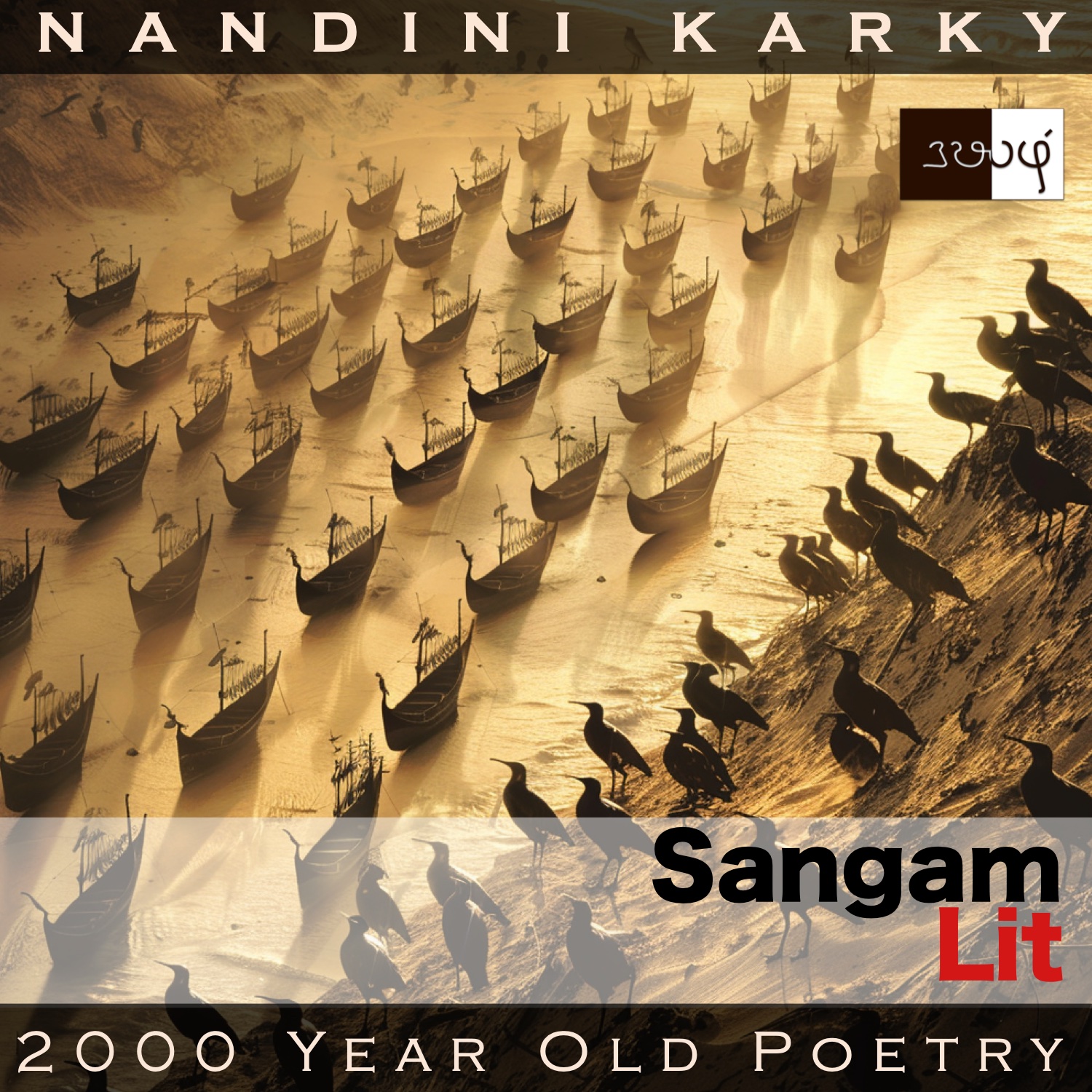Podcast: Play in new window | Download
Subscribe: Apple Podcasts | Spotify | Amazon Music | Android | iHeartRadio | TuneIn | RSS | More
In this episode, we listen to an argument put forth to persuade a person, as portrayed in Sangam Literary work, Kalithogai 132, penned by Nallanthuvanaar. The verse is situated in the ‘Neythal’ or ‘Coastal Landscape’ and presents insightful images from an ancient seashore.

உரவு நீர்த் திரை பொர ஓங்கிய எக்கர்மேல்,
விரவுப் பல் உருவின வீழ் பெடை துணையாக,
இரை தேர்ந்து உண்டு, அசாவிடூஉம் புள்ளினம் இறை கொள
முரைசு மூன்று ஆள்பவர் முரணியோர் முரண் தப,
நிரை களிறு இடை பட, நெறி யாத்த இருக்கை போல்
சிதைவு இன்றிச் சென்றுழிச் சிறப்பு எய்தி, வினை வாய்த்து,
துறைய கலம் வாய் சூழும் துணி கடல் தண் சேர்ப்ப!
புன்னைய நறும் பொழில் புணர்ந்தனை இருந்தக்கால்,
‘நன்னுதால்! அஞ்சல் ஓம்பு’ என்றதன் பயன் அன்றோ
பாயின பசலையால், பகல் கொண்ட சுடர் போன்றாள்
மாவின தளிர் போலும் மாண் நலம் இழந்ததை?
பல் மலர் நறும் பொழில் பழி இன்றிப் புணர்ந்தக்கால்,
‘சின்மொழி! தெளி’ எனத் தேற்றிய சிறப்பு அன்றோ
வாடுபு வனப்பு ஓடி வயக்கு உறா மணி போன்றாள்
நீடு இறை நெடு மென் தோள் நிரை வளை நெகிழ்ந்ததை?
அடும்பு இவர் அணி எக்கர் ஆடி நீ மணந்தக்கால்,
‘கொடுங் குழாய்! தெளி’ எனக் கொண்டதன் கொளை அன்றோ
பொறை ஆற்றா நுசுப்பினால், பூ வீந்த கொடி போன்றாள்
மறை பிறர் அறியாமை மாணா நோய் உழந்ததை?
என ஆங்கு
வழிபட்ட தெய்வம்தான் வலி எனச் சார்ந்தார்கண்
கழியும் நோய் கைம்மிக அணங்குஆகியது போல,
பழி பரந்து அலர் தூற்ற, என் தோழி
அழி படர் அலைப்ப, அகறலோ கொடிதே.
Yet again, a plea on behalf of a friend. The words can be translated as follows:
“Upon the soaring sand dunes, assailed by waves of the spreading sea, after choosing and feeding upon their prey, with their loving mates, rest herds of birds in many different forms. Akin to rows of battle elephants, belonging to the one, who rules over the drums three, and who utterly ruins the strength of his enemies, placed in perfect intervals, are the ships, which have completed their missions, without any ruin whatsoever, and won over fame wherever they went, adorning the cool shores of your domain, O lord of the shining seas!
After you embraced her in the shade of the laurel wood tree, you promised to her saying ‘O maiden with a fine forehead! Fear not!’. Isn’t that what has caused the maiden to lose her esteemed beauty, akin to a tender mango shoot, and be covered in pallor, appearing like the glow of a lamp during the day?
After you flawlessly embraced her in the many-flowered, fragrant grove, you cheered her saying, ‘O maiden of few words! Understand and be clear’. Isn’t that what has endowed the state, wherein the rows of bangles slip away from the slender, curving, soft arms of that maiden, whose beauty has faded and ruined, akin to an unpolished sapphire?
After playing in the fine sands covered with beach morning glory vines, you hugged her and said, ‘O maiden wearing curving earrings! Understand and be clear’. Isn’t that because she accepted that as your pledge that has now made her suffer with this unceasing disease, which she hides from the knowledge of others, making that maiden, whose has a slender waist, unable to bear the burden of her jewels, now become like a vine, bereft of flowers?
And so, akin to how a god worshipped as one’s strength, transforms to become the attacking spirit, making the affliction of the worshipper get out of hand, causing slander and blame to spread around, it’s terrible of you to part away, leaving my friend in this deep despair!”
Let’s delve into the details. The verse is situated in the context of the man’s parting from the lady, prior to marriage, and here, the confidante renders these words to the man. She begins by describing his shores, where on one side, seabirds are resting with their mates on sand dunes, after choosing from the bounty of prey and feeding to their full. To depict the scene on the other side of the shore, an image of neat rows of battle elephants of a king, who is said to extended his dominion over drums three, possibly referring to a Pandya King, who had extended his power in the Chera and Chozha countries as well, is put forth. This simile of rows of elephants, separated by intervals, has been employed to talk about the ships that have returned from their missions, without even a scratch, fully intact, after sailing in faraway seas, and earning esteem and praise wherever their sails fluttered.
Returning, we find the confidante moving towards the crux of the matter by reminding the man about the promises and clarifications he gave the lady as he united with her in the shade of the laurel wood tree, in the seashore grove and in the spreading sands filled with morning glory vines. The lady accepted and trusted in all these words and now because the man seems to have forgotten those promises and parted away, she finds herself in a state, where pallor covers her, her bangles slip away and the disease of affliction soars so much, even as the lady tries to hide it from all others, intending to protect her man. Her beauty, which was exquisite before, has now become a lamp lit during the day, an unpolished sapphire and a vine, whose flowers have abandoned it. After these descriptions of the lady’s state, the confidante concludes by portraying how the man, who had been the god, who rendered grace, had now become the attacking sprit in the life of the lady, because of his staying away and delaying seeking the lady’s hand. Though it’s another case of ‘Marry her, marry her’, we can choose to extract that scene of the intact ships that have seen shores many and returned with success, to perceive the extent of the shipbuilding industry and the maritime trade of the ancient Tamils.




Share your thoughts...